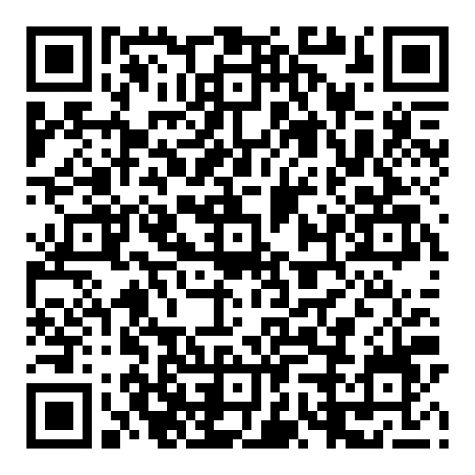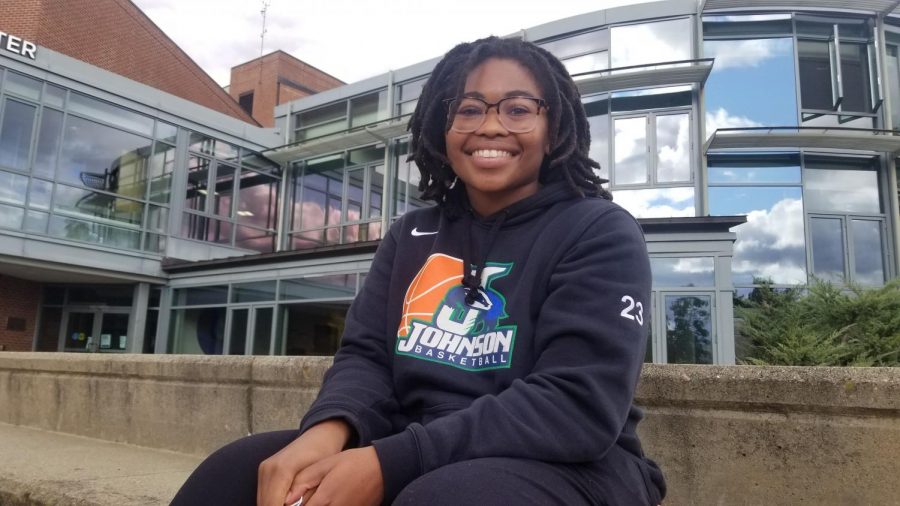Coalition of Minority Students seeks anti-racist pledge approval
As the Vermont State College System prepares for unification, Northern Vermont University student Devyn Thompson, leader of the Coalition of Minority Students, is seeking another kind of unity by pushing for an anti-racist pledge to be enacted by the VSCS.
“The ultimate goal is to make it official by the time we merge as one university,” Thompson said of the pledge, which has been worked on for the past year. Thompson is an education major in her junior year at NVU-Johnson. Alongside her leadership role in COMS, she plays for the women’s basketball team and is vice president of the Student Government Association.
COMS, which began as the Coalition of Minority Student Athletes when it was formed in fall 2020, has been leading efforts to create a mandatory anti-racist pledge not only for NVU-Johnson, but for the entire Vermont State Colleges System.
According to the pledge, “anti-racism is the practice of equitably advocating for all races by working to address and dismantle racism within ourselves and our society through intentional and sustained actions that challenge and change racist ideas, policies, behaviors, and beliefs.
“Anti-racism is a constant educational process. It questions why power is held in the hands that it is, where within us and within our systems these structures manifest, and how we can change these dynamics to create more equitable systems for all people.”
Thompson said the group was inspired partially by the COVID-19 pledge which students were required to sign before returning to campus last year. Ideally though, she said the anti-racist pledge would be re-signed by students, staff, and faculty each year. “We want it to be more of a commitment instead of a one and done.”

She worked with the group’s former leader, Ayodeji Shokeye, who graduated last year, and now continues to press forward in efforts to have the pledge approved by the Board of Trustees.
Thompson hopes the pledge will be integrated by the time the new university is formed. She said in recent years, she has noticed more new students of color coming to NVU, and establishing a devotion to a welcoming, anti-racist Vermont State University is essential to providing equal education to all students, regardless of race.
“Honestly, I worry about them consistently,” she said. “I worry for their safety. I worry for their well-being. Because I remember when I was a freshman, there’s the mental toll of being the only person of color on a sports team, being the only person of color in a classroom setting. It gets you.”
Getting the pledge approved by the administration has not been an easy task. Thompson said that while the board has been mostly supportive and has offered helpful advice, COMS and the board of trustees often disagree over specifics.
“We’re on our fifth set of edits because we can’t agree on a pledge that everyone can stand on,” Thompson said. “We’ve listened to the edits, the recommendations, and we’re making them–we’re choosing friendly language, we’re choosing language that makes sense.”
Thompson said a recurring complaint of the board has been the length of the pledge. COMS has been pressing for a longer, more detailed pledge, whereas the board has requested it be cut down.
Part of the pledge’s length comes from the depth at which it addresses the issues it seeks to dismantle. As the pledge aims to be signed by all members of the VSCS–staff and faculty as well as students–it contains goals and commitments geared toward all institutional levels.
Some of these commitments include bringing Diversity, Equity, and Inclusion learning goals into general education requirements and creating permanent safe spaces with institutional support rather than forcing students to create and maintain them on their own.
Thompson said COMS met with Chancellor Sophie Zdatny and Trustee Shirley Jefferson on Monday, Oct. 11, to gauge their support before bringing the pledge before the board’s DEI committee during their meeting on Oct. 15.
“I’m hoping this is the last time that I have to go back and edit this pledge…” she said. “The fact that we have students who agree with what we’re saying, I’m hoping the board takes that and finally listens.”
While Jefferson and Zdatny both reminded COMS that not everyone in the VSCS will agree the pledge or advocate for anti-racism, Thompson said that as of printing, the pledge has been signed by over 80 members of the NVU community, including faculty, staff and students.
Resistance toward approving the pledge is only one of the administrative roadblocks COMS has come up against. “[We get told] ‘you can’t hang posters here,’ when there’s other posters in the same spot…” Thompson said. “We’re just trying to cooperate and make this as civil as possible, because at the end of the day, we’re not trying to fight anybody–we’re trying to advocate for ourselves.”
Despite being a small campus which emphasizes its commitment to community, discrimination is not absent from NVU-Johnson’s campus. Thompson said as the leader of COMS, she’s often the first to hear from students who feel unsafe or have been victims of racist behavior.
Thompson described several stories of discriminatory behavior, such as a student using a racial slur as an example in a question, or how during an education course, “a student felt the need to say you’re discriminating towards white people if you teach critical race theory.”
During her freshman year, posters were put up around campus with derogatory remarks and slurs written on them. This year, the posters advertising the pledge have been torn up and thrown away. She noted that racial profiling occurs regularly on campus and can frequently involve professors as well as peers.
“I held the door for an older white woman, and she just scowled at me,” Thompson said. “That was my freshman year, and I still remember it. We call them microaggressions, but at the end of the day, is it really micro? It’s just one thing on top of another.”
Thompson also mentioned how the Black Lives Matter flag flown on the quad has been stolen twice. She said that while the school did replace the flag, that kind of attitude and solution is part of the problem, as the incident was swiftly forgotten.
“The first time, okay, replace it,” she said. “The second time? You didn’t open an investigation. You didn’t have a school-wide assembly or mass email. That could have been a perfect teaching opportunity, if anything, to say, ‘hey, we don’t stand for this.’ They didn’t capitalize on that, and I was honestly very disappointed.”
To lend support, Thompson said filling out the pledge is the easiest and most effective step for most students. Posters with QR codes can be found around campus, and a direct link can be found at the bottom of this article on the Basement Medicine website.
“I’ve had close friends who actually have put the poster… in their dorm buildings, on their doors… I love the fact that people are so willing to help and get the word out,” Thompson said. Other students can spread awareness of the pledge through social media and word of mouth.
In addition to this kind of activism, Thompson said it’s also important to put effort into creating a safe and welcoming environment for students of all races and ethnicities. She noted the importance of not only monitoring one’s own words and actions, but of speaking up at acts of discrimination around campus.
“Now is not the time for you to look the other way,” Thompson said. “You can’t. You have to educate yourself… and if you see something, say something, like with everything else. Everyone deserves to feel safe here, and even if you’re not personally aware of the discrimination that happens, you can still be an ally…
“We’re all paying tuition to be here. We all just want to be to get an education, at the end of the day, graduate and have that college experience,” she continued. “You rob someone of that experience every time you go out of your way to be ignorant, to be a bigot toward them, to go out of your way to make someone not feel safe.”
Likewise for faculty, signing the pledge is a good start, but Thompson said creating safe learning environments and introducing diversity into curriculum is an even better way to show support and to help educate students against ignorance.
“There’s no reason why we should be reading old, dead, white men, and that’s it…” Thompson said. “There’s so many simple ways you can integrate diversity into your content. I feel like a lot of professors will say, ‘oh, this is a math course, I can’t.’ Not true. That’s not true. There’s always a way.”

Senior, Creative Writing
From Fletcher, VT
Spring 2020-Present
"Call me mommy and I'll bring you blankets and hold you while you cry."



